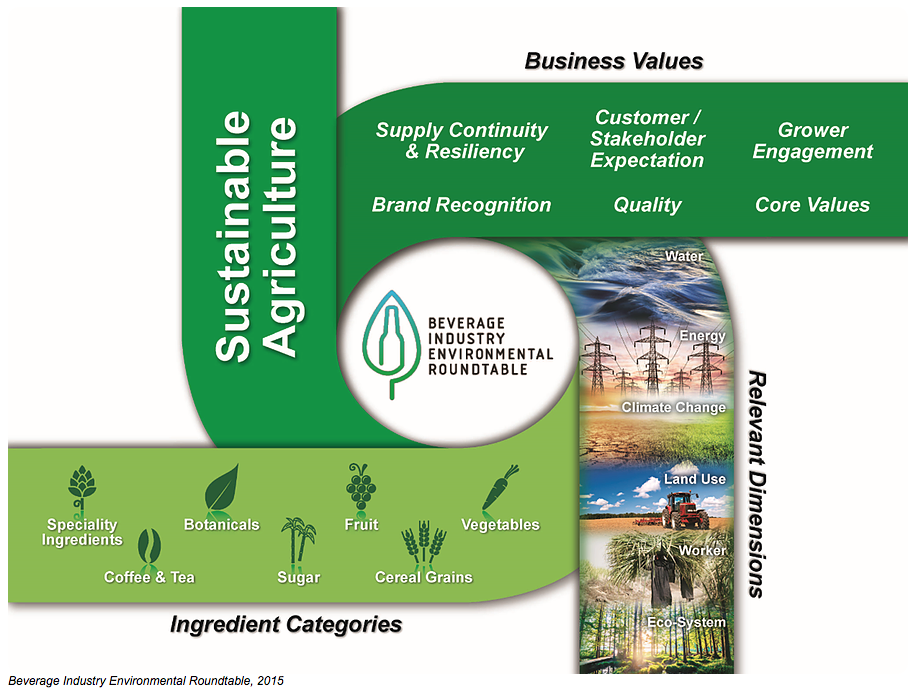Sustainable Agriculture
Promoting responsible farming and supply chain practices
Beverage Industry Environmental Roundtable members define sustainable agriculture as the responsible stewardship of farming while balancing these three critical dimensions:
- Business value
- Environmental and social impacts
- Need for unique ingredients
Balancing these key issues requires a unique vision and commitment to our sustainable future. Below, you’ll find the challenges members face, current best practices, and future outlooks.
Jump to our vision for sustainable agriculture, our theories put into practice, and the key questions we are asking.
Defining the Challenge
Agriculture is an essential component to most beverage production, making sustainable practices a critical area of focus for BIER members. Because members have diverse product lines and circumstances, a number of factors informed our efforts to create a streamlined definition. These include members’:
- Heterogeneous supply chains, with differing raw ingredients in various geographic regions;
- Varied grower engagement, ranging from individual farmers to large suppliers;
- Challenges of physically connecting with a large number of farmers;
- Data scarcity;
- Need to preserve supply continuity and resiliency;
- Ongoing task of managing stakeholder expectations;
- The core need to maintain product quality; and
- Need for more proven methods to efficiently measure results.
BIER members navigate these complexities on a daily basis and recognize that any useful, actionable definition of sustainable agriculture must take these challenges into account in order to drive change.

These three streams of sustainable agriculture must be recognized by global organizations when crafting solutions for farming and minimizing negative impacts. Sustainable agriculture’s best solutions are complex blends of the three streams, and we believe companies striving for the greatest impact in their production processes will interweave these into planning and practice.
For BIER, this definition framework provides clarity, insight, and direction to our work in developing tools and conducting research in sustainable agriculture, helping to accelerate learning and implementation of best practices.
Theory into Practice
BIER members have increasingly embraced a myriad of opportunities related to sustainable agriculture and regenerative agriculture, and are individually and collectively making demonstrable progress, with more yet to come. BIER members employ a number of best practices;
- Engaging with agricultural ingredient suppliers to understand business drivers for change, deliver training on practices, review key performance indicators (KPIs), and share knowledge and experience;
- Creating targeted stakeholder engagement and cooperation in water-stressed locations, and reducing water use;
- Reducing pesticide applications by a variety of means, including alternating crop rows;
- Adjusting land use to restore and enhance biodiversity;
- Incorporating technology to better optimize water and nutrient applications;
- Switching to native regional crops;
- Using facility compost as a natural fertilizer;
- Reducing reliance on fuel-based farm equipment;
- Applying the principles of organic and bio-dynamic agriculture; and
- Sharing best practices between member companies and beyond.
Asking the Tough Questions
An unprecedented opportunity exists to evolve the way we farm using regenerative agriculture and other sustainable practices.
Adjusting agricultural practices in ways that enhance yields while also preserving our ecosystems, regenerating our lands, and rejuvenating biodiversity is absolutely possible. Our members consistently discover that, by combining less environmentally impactful farming practices with more holistic ecological thinking, we can meet our shorter-term needs and ensure we have the appropriate natural resources to meet those needs long into the future.
That being said, the field of sustainable agriculture is in flux. BIER has identified a number of aspects of sustainable agriculture and ecosystem preservation that will continue to benefit from ongoing research improvement, long into the future. Three clear questions in need of further work and development include:
- How do we apply, at scale, practices that maintain and positively impact the local ecosystem, while at the same time allowing for optimum crop yields?
- How do we develop appropriate KPIs for measuring end results and impacts vs. milestones and indirect measures that predominate today?
- How do we forge collaborative solutions with local governance to enable more realistic and holistic behavior to optimize land and water resources?
Striving to protect, preserve and rejuvenate our natural ecosystems through more sustainable agricultural practices is an aspiration that is achievable, but one that will require strong governance and collaboration across the complete supply chain. BIER believes there is much that can be done in this dimension–new collaborations to be developed, lessons to be learned, knowledge and experience to be shared, and innovations to be made–before we realize our full potential.
Want to discuss these questions or learn more about how you can collaborate with BIER on this important dimension of sustainability? Contact us.
Although agriculture is a mature industry, inefficiencies remain. There are significant opportunities for environmental improvement.
Learn more about how BIER’s workstreams, such as sustainable agriculture, support the United Nation’s Sustainable Development Goals.
